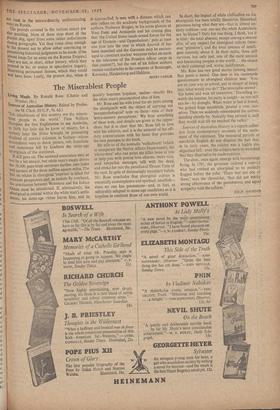The Misera blest People
lir. inhabitants of this country are the misera- _°Iest people in the world.' Thus William vampier, the first Englishman to see Australia, in 1688; but little did he know of misery, for a century later the Sirius brought its pioneering shipload of convict colonists to Sydney—whose descendants were to shoot, poison, rob, humiliate and sometimes kill by kindness the stone-age aboriginals of the continent.
It still goes on. The national conscience may at last be a bit uneasy, but white man's magic drives the 50,000 pure-bred survivors farther into holes and corners of the three million square miles. The ban on whites in aboriginal 'reserves' is lifted for uranium prospectors and, as rockets fly overhead, the sanctuaries between Woomera and the Indian Ocean must be abandoned. If, alternatively, the aboriginal is enticed within the white man's settle- Inents, his stone-age virtue leaves him, and he
quickly becomes hopeless, useless—exactly like the white man's preconceived idea of him.
Mr. Rose and his wife lived for six years among the aboriginals with the object of carrying out 'parapsychological' tests on them—tests of their 'extra-sensory perceptions.' We hear something of these tests, and details are given in the appen- dices, but it is clear that Mr. Rose fell in love with his subjects, and it is the account of his off- duty conversations with his hosts that provides the best passages in the book.
He tells us of the nomadic 'walkabouts' (which so exasperate the Native Affairs Department), the `clever-men' who can point the killer bone at you or help you with potent love charms, make rain, send telepathic messages, talk with the dead, and evoke for you the paradisical Dream Time of the race. In spite of distressingly insanitary habits, Mr. Rose concludes that aboriginal culture is essentially contemplative and spiritual, unselfish— since no one has possessions—and, in fact, as admirably adapted to stone-age conditions as it is hopeless to confront those of our own world.
In short, the impact of white civilisation on the aboriginals has been totally disastrous. Historical processes being what they are—that is, almost en- tirely ruthless—can one say the white Australians are `to blame'? Only for one thing, I think, but it is vital : the total absence, except among a minute elite, of any respect for aboriginal culture (how- ever 'primitive'), and the total absence of intelli- gent curiosity about it. In their midst, there still survives, but only just, one of the most ancient and fascinating peoples in the world ... the object of their contempt and, worse, indifference.
Mr. Rose has two good stories (among many) that point a moral. One item in his mammoth questionnaire to aboriginal children was: 'You are on your way to school, and in danger of being late; what would you do?' The invariable answer : 'Go home and wait till tomorrow.' Travelling to- wards the interior, his party is caught—as you still can be—by drought. When water at last is found, 'we gulped huge mouthfuls, poured it over our- selves. Then we suddenly remembered the natives standing silently by. Stoically they refused it, said they would wait till we reached the valley.'
Sources of Australian History is a superb collec- tion from contemporary accounts of the settle- ment of the cdntinent. The measured periods of mandarin English do not disguise the fact that, in its early years, the colony was a highly dis- organised hell : even the soldiers were so wretched that-they deserted to be made convicts.
The abos., once again, emerge with boomerangs flying. In 1791, the governor ordered a convict who had robbed an aboriginal to be publicly flogged before the tribe. 'There was not one of them,' says the chronicler, 'that did not testify strong abhorrence of the punishment, and equal sympathy with the sufferer.'










































































 Previous page
Previous page